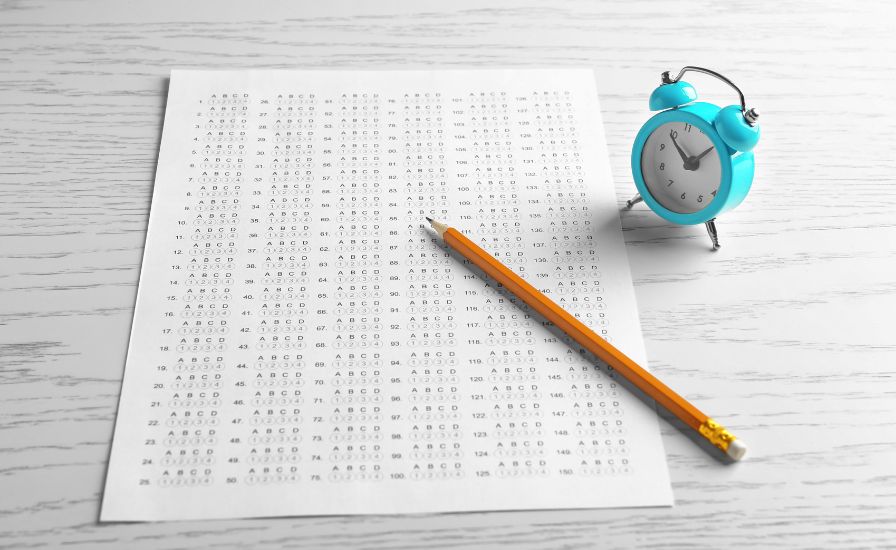11 Plus Mock Exams
The journey to secondary education can be a pivotal time for students, with the 11 Plus mock exams serving as a crucial milestone. Understanding why 11 Plus mock exams are important can be the key to unlocking a child’s potential and significantly boosting their confidence and performance on the actual test day. This blog explores the benefits of 11 Plus mock exams and how they contribute to a child’s success.
Building a Foundation with 11 Plus Mock Exams
One of the main reasons why 11 Plus mock exams are important is that they provide a solid foundation for understanding the exam structure. These exams, including the 11 Plus GL mock exams, mimic the format of the actual test, which includes sections on verbal reasoning, non-verbal reasoning, quantitative reasoning, and English. By taking these practise tests, children get familiar with the types of questions they will face, reducing their anxiety and improving their overall test-taking strategy.
The Role of Familiarity in Reducing Test Anxiety
Test anxiety is common among children facing the 11 Plus exams, primarily due to the unfamiliarity and high stakes associated with them. However, why 11 Plus mock exams are important extends to their role in familiarising students with the testing environment. Regular exposure to the exam format through mock exams helps mitigate fears and builds confidence, which is crucial for optimal performance on the actual day.
Realistic Practise with 11 Plus GL Mock Exams

Why 11 Plus mock exams are important also relates to the realistic practise they offer. The 11 Plus GL mock exams are designed to reflect the actual exam’s difficulty and time constraints, providing students with a real-world testing experience. This exposure is invaluable as it helps students manage their time effectively, understand the pressure of the exam conditions, and learn how to pace themselves throughout the duration of the test.
Feedback and Improvement
After each mock exam, students receive feedback on their performance, which highlights their strengths and identifies areas needing improvement. This is why 11 Plus mock exams are important—they allow students and parents to see which topics or question types are well-handled and which require more focus. As a result, subsequent studies can be more targeted and efficient, addressing weaknesses and reinforcing strengths.
Continuous Learning Through 11+ Practise Papers
The use of 11+ practise papers in preparation for the mock exams serves as an ongoing learning tool. These practise papers are typically structured like the actual exams and help students continually apply what they’ve learnt in a simulated test environment. The repetitive nature of completing practise papers enhances retention and understanding, further illustrating why 11 Plus mock exams are important.
Preparing with the Mock Exam Centre

The Mock Exam Centre offers a centralised place where students can take simulated exams that are closely monitored and timed, mimicking the actual 11 Plus exam environment. This experience is crucial because it teaches students how to handle the physical and mental aspects of sitting through an exam. The opportunity to take exams at a Mock Exam Centre is a valuable part of preparing for the 11 Plus, making it clear why 11 Plus mock exams are important.
Long-Term Academic Benefits
Beyond immediate exam preparation, why 11 Plus mock exams are important also includes the long-term academic benefits they provide. Students develop strong study habits and test-taking strategies that are applicable across various academic disciplines. The skills learnt through rigorous mock exam preparation—such as time management, problem-solving, and critical thinking—are invaluable throughout a student’s academic career and beyond.
Psychological Preparation
The psychological aspect of preparing for exams is often underestimated. Children need to be mentally ready to tackle the pressures of a timed, high-stakes test like the 11 Plus. Parents and educators can help by providing a supportive environment that reduces stress and anxiety. Techniques such as mindfulness exercises, relaxation routines, and positive affirmations can be useful tools to help children manage pre-exam nerves.
Developing Effective Study Habits
Study habits formed during the preparation for the 11 Plus can benefit a child throughout their education. It is important for children to learn how to organise their study time, prioritise tasks, and break down large volumes of material into manageable segments. Parents can aid in this by helping set up a consistent study schedule, providing a quiet and well-organised study space, and teaching children how to set short-term goals.
Encouraging a Positive Mindset
A positive approach to learning and exam preparation can significantly influence a child’s performance. Encouraging a growth mindset, where challenges are seen as opportunities to learn rather than obstacles, can help children remain motivated and engaged. Celebrate small achievements along the way to keep morale high, and always focus on effort rather than innate ability.
Regular Breaks and Balanced Lifestyle
While studying is crucial, it is equally important to ensure that children have regular breaks and a balanced lifestyle. This includes adequate sleep, nutritious food, physical activity, and time for relaxation. A well-rounded routine helps maintain a child’s overall health and enhances their cognitive functions, like memory, attention, and problem-solving skills.
Simulation Beyond Mock Exams

Apart from participating in formal mock exams, creating simulated test conditions at home can also be beneficial. Set up a quiet room with a timer and have your child practise with past papers or new practise tests. This not only helps in building stamina for the actual exam but also teaches children how to apply their knowledge under exam conditions.
Communication and Support
Open communication is key during the preparation period. Regular discussions about their feelings towards the exam and any challenges they are facing can help children feel supported and understood. This also provides an opportunity for parents to offer guidance, reassurance, and adjustments to the study plan as needed.
Learning from Mistakes
Teaching children to view mistakes as learning opportunities rather than failures is crucial. Reviewing mock exam results and practise papers together can be a constructive activity, where you help your child understand what went wrong and how to improve. This reinforces the concept that every mistake is a step towards mastering a subject.
To further enhance the preparation process for the 11 Plus exams, here are targeted strategies and tools that directly address common concerns and needs of students facing these tests. These insights are specifically designed to help students maximise their study effectiveness and boost their exam performance.
Understanding Exam Content and Format
Students preparing for the 11 Plus exams should start with a thorough understanding of the exam content and format. Each exam board has slightly different requirements, so identifying which board’s exam they will be taking (such as CEM or GL Assessment) is crucial. Detailed knowledge of the subjects tested—verbal reasoning, non-verbal reasoning, quantitative reasoning, and English—helps tailor the study approach to cover all necessary areas.
Strategic Study Techniques

Active Recall and Spaced Repetition: These are powerful learning techniques. Active recall involves testing one’s own knowledge regularly, rather than passively reading or reviewing notes. Spaced repetition leverages increasing intervals of time between subsequent review of previously learnt material to exploit the psychological spacing effect. Apps like Anki or Quizlet can be used to implement these strategies effectively.
Mind Mapping: This technique helps in visualising connections between different pieces of information, which can be particularly helpful for subjects like verbal reasoning. Creating mind maps can aid in understanding and remembering complex concepts more easily.
Subject-Specific Tips
Verbal Reasoning: For verbal reasoning, building a strong vocabulary is essential. Regular reading and using vocabulary-building apps can enhance a student’s language skills significantly. Practising different types of verbal reasoning questions is also crucial to become familiar with the patterns and logic used in the exam.
Non-Verbal Reasoning: This section can be challenging due to its abstract nature. Practise is key in developing the ability to quickly recognise patterns and solve visual puzzles. Using diagrammatic reasoning books or apps designed for non-verbal reasoning can provide valuable practise.
Mathematics: Clarity in fundamental mathematical concepts and operations is vital. Regular practise using timed quizzes and mock tests can help improve speed and accuracy.
English: Strong reading comprehension skills are necessary for the English component of the 11 Plus. Encouraging daily reading and discussing the content can improve understanding and analytical skills. Writing practise should also not be overlooked; regular essays, summaries, and comprehension answers can hone writing skills.
Time Management
Managing study time effectively can make a significant difference in preparation. Creating a study schedule that allocates time based on the child’s strengths and weaknesses helps ensure that all subjects receive adequate attention. Time management during the exam itself is also critical; practising with timed tests helps students get used to pacing themselves to complete the exam within the allotted time.
Health and Well-being
Lastly, the importance of maintaining good health through diet, exercise, and sufficient sleep cannot be overstated. A healthy body supports a healthy mind, which is crucial in the run-up to the exams. Simple changes, like ensuring a protein-rich breakfast on the day of the exam, can help maintain energy levels and focus.
Conclusion
In conclusion, the importance of 11 Plus mock exams cannot be overstated. They prepare students not only for the specific challenges of the 11 Plus exams but also equip them with skills and confidence that benefit their broader educational journeys. Parents looking to support their children’s success in the 11 Plus exams should consider integrating GL mock exams, practise papers, and sessions at a Mock Exam Centre into their preparation plans. This comprehensive approach is why 11 Plus mock exams are important and how they can dramatically impact a child’s academic success.









Leave a Reply